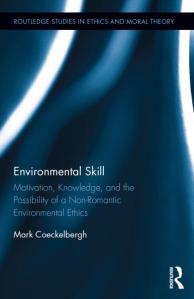Motivation, Knowledge, and the Possibility of a Non-Romantic Environmental Ethics.
(New York: Routledge 2015)
[more…] NOW AVAILABLE AS PAPERBACK!
Abstract. Today it is widely recognized that we face urgent and serious environmental problems and we know much about them, yet we do very little. What explains this lack of motivation and change? Why is it so hard to change our lives? This book addresses this question by means of a philosophical inquiry into the conditions of possibility for environmental change. It discusses how we can become more motivated to do environmental good and what kind of knowledge we need for this, and explores the relations between motivation, knowledge, and modernity. After reviewing a broad range of possible philosophical and psychological responses to environmental apathy and inertia, the author argues for moving away from a modern focus on either detached reason and control (Stoicism and Enlightenment reason) or the natural, the sentiments, and the authentic (Romanticism), both of which make possible disengaging and alienating modes of relating to our environment. Instead he develops the notion of environmental skill: a concept that bridges the gap between knowledge and action, re-interprets environmental virtue, and suggests an environmental ethics centered on experience, know-how and skillful engagement with our environment. The author then explores the implications of this ethics for our lives: it changes the way we think about , and deal with, health, food, animals, energy, climate change, politics, and technology.
Review by Jochem Zwier and Andrea Gammon in Human Studies
Review by Tara Kennedy in Notre Dame Philosophical Reviews
Review by Louke van Wensveen in Environmental Ethics
Review by Glen Miller and Tong Li in Science and Engineering Ethics
About Environmental Skill
“A much-needed fresh approach to the environmental concerns of the average person.” —Ladelle McWhorter, University of Richmond, USA
“Environmental ethics often seeks to develop a suitably modern solution to the problems imposed by modernity—solutions rooted in enlightenment thinking and romanticism. Mark Coeckelbergh’s Environmental Skill takes an entirely different approach, demonstrating that it is modernity that is the problem and developing an innovative form of environmental ethics that relies not on better knowledge about the world but more attentive and skill ways of being-in-the-world.” —David J. Gunkel, Northern Illinois University, USA
“This new book by Mark Coeckelbergh is an insightful argument for an environmental philosophy that draws on the resources of and at the same time extends work in philosophy of technology. The notion of skilled engagement with the world as this has emerged from pragmatism and phenomenology is here deepened and re-thought in an effort to understand and respond to the challenges of living in a techno-transformed nature.” —Carl Mitcham, Colorado School of Mines, USA
“One of the strong points of Coeckelbergh’s diagnosis is that it deepens the discussions regarding environmental concerns and the problem of motivation by laying bare the modern roots of these phenomena. … Coeckelbergh can and perhaps should be read as practicing what he preaches: Environmental Skill is a demonstration that even the practice of environmental philosophy might be evaluated and steered away from its modern preoccupations towards the cultivation of greater engagement and therefore environmental skill. In this way, Coeckelbergh’s book stands as a reminder that practicing environmental philosophy always means relating to one’s environment in a certain way and that questioning and skillfully dealing with this relation remains an ongoing task.” – Jochem Zwier and Andrea Gammon in Human Studies
“There is much for contemporary environmentalists to find compelling about Coeckelbergh’s account, being not only an interesting analysis of the factors at work in motivation but also a convincing and optimistic approach to the problem. …a compelling account of the problem of motivation and how the development of an ethics of skilled engagement with the environment, a focus on habit and virtue, would find us better equipped to deal with the environmental crises we face. It is a welcome and interesting addition to a field in need of voices focused on bringing about meaningful, practical change.” – Tara Kennedy in Notre Dame Philosophical Reviews
“Coeckelbergh’s Environmental Skill issues a helpful reminder to be aware of an overly autistic, obsessively controlling tendency in Western philosophical and everyday cultures. Such a distancing pattern and its ideological scaffolding prevent environmental action. Just as autistic children can benefit from the right kind of physical engagement, all “moderns” can benefit from virtue cultivation qua embodied, situated, relational practice.” – Louke van Wensveen in Environmental Ethics


2 thoughts on “Environmental Skill”
Comments are closed.